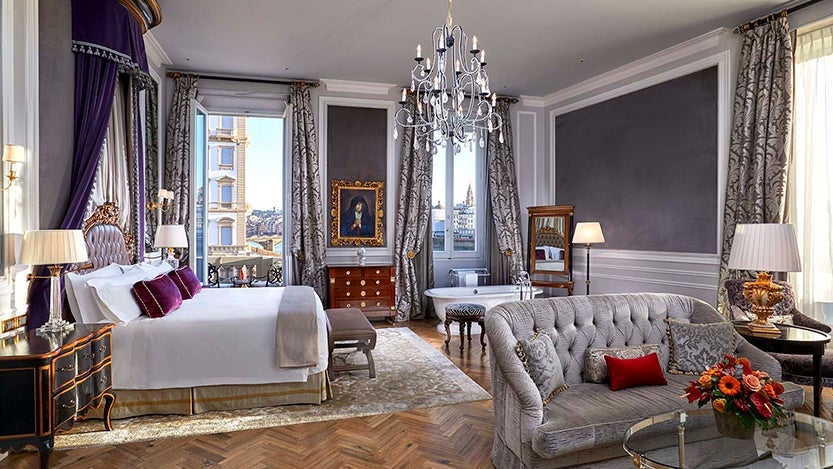What is Starwood Preferred Guest Elite Status Worth in 2018?
Update: Some offers mentioned below are no longer available. View the current offers here.
Earning elite status with a hotel chain can unlock a variety of valuable perks for your next trip, including bonus points, room upgrades and free breakfast (to name a few). However, it can be challenging to identify just how much these benefits are worth. Today I'll continue the 2018 iteration of my annual series that analyzes the major hotel programs' elite status tiers to try to peg a value on each one. After starting with Hilton Honors, I'll now move onto a TPG (and reader) favorite: the Starwood Preferred Guest program.
Before getting into the analysis, it's important to note that, as of the time of writing, SPG continues to operate as its own loyalty program, even though the merger with Marriott was approved back in 2016. However, shortly after the merger was finalized, it became possible to link your accounts and match your elite status from one program to the other. I'm including these reciprocal statuses below (where applicable), but note that as of the time of writing, you aren't able to earn SPG elite status by staying at Marriott properties, nor can you earn Marriott status by staying at SPG hotels.

In addition, it's important to point out that the calculations below represent one method for estimating the value of SPG elite status. If you're traveling with family members, you may value room upgrades significantly higher, whereas business travelers may be able to expense breakfast and thus don't care about having it included. Feel free to adjust the numbers to more accurately reflect your personal travel preferences.
Another important note: The final numbers for each tier represent the total value you'd receive after earning the given status and continuing to qualify in each subsequent year. Some of you may be starting from scratch, and if that's the case, you won't receive any benefits for the first several stays. To help those of you in that position, I've included a spreadsheet toward the end of the post to estimate the cumulative value you'd get as you move from no status on up the hierarchy.
Finally, I have made some key assumptions to land at my final values for each tier of the SPG program:
- You complete 20% more stays/nights than the minimum required for the given level.
- You spend an average of $150 per night.
- Your average stay is 1.5 nights in length.
Like I always say, please feel free to adjust these assumptions to match your typical travel patterns.
[table-of-contents /]

Two final details… for any bonus points earned, I'm basing the value on TPG's most recent valuations, which peg Starpoints at 2.7 cents apiece. I've also rounded up all numbers to the nearest $5 to make the math a bit simpler.
So given all of these details, how much value can you get out of the different levels of the Starwood Preferred Guest program?
SPG Gold ($690)

The lowest tier in the Starwood Preferred Guest Program is Gold status, which is typically earned after 10 stays or 25 nights. It's also included as an automatic benefit on the Platinum Card® from American Express (for instructions on how to activate this benefit, check out this post). You can also earn Gold status by spending $30,000 in a calendar year on either the Starwood Preferred Guest® Credit Card from American Express or the Starwood Preferred Guest® Business Credit Card from American Express. For this analysis, I'll assume that you complete 12 stays with a total of 18 nights.
- 50% bonus points ($75): As an SPG Gold member, you'll earn an additional Starpoint for every dollar spent. With 18 nights at $150 apiece, you'll spend a total of $2,700 and thus take home an extra 2,700 points, worth $72.90.
- Late checkout ($50): Gold members are also able to take advantage of a guaranteed 4pm late checkout, though this is subject to availability at resort and conference center hotels. This can be a very nice perk if you need extra time, especially since most hotels are obligated to honor it (rather than being on request like many other programs).
- Room upgrades ($270): You'll also be able to score upgrades to "enhanced" rooms at check-in, be it with a better view, on a higher floor or in a corner. This isn't available at Aloft and Element properties and explicitly excludes suites, but it can still be a nice perk for a low-level elite. I'll assume a conservative valuation of $15 per night.
- Welcome gift ($60): You can also choose a welcome amenity upon arrival, either bonus Starpoints (250 at most properties, 125 at Four Points, Aloft and Element) or a drink. I'll peg this at $5 per stay.
- Complimentary preferred internet ($20): When you book your stay through an official SPG channel, you're eligible for complimentary preferred internet in addition to the aforementioned welcome gift. I (personally) haven't noticed substantial differences in browsing speeds, so I'll value this at just $1 per night.
- Crossover Rewards with Delta ($15): Another nice perk of SPG Gold status is the ability to utilize the Crossover Rewards program with Delta. This allows you to earn 1 bonus Starpoint for every dollar spent on eligible Delta flights (base fare only). This could be quite lucrative for regular Delta flyers (I earned over 12,000 bonus Starpoints back in 2014 during my "road warrior" days), but I'll assume a conservative $500 of spending on Delta flights. This will give you 500 extra Starpoints, worth $13.50.
- Marriott Gold status ($200): The final perk of SPG Gold status isn't officially listed as a benefit but took effect in September 2016 when it became possible to link your Marriott and SPG accounts. If you hold Gold status with SPG, that automatically gives you Gold status with Marriott. This is undoubtedly more valuable than matching status the other way (Marriott Gold to SPG Gold), as you'll enjoy lounge access, true room upgrades (including suites) and an array of other perks. While the true value of this depends on how frequently you visit Marriott properties, I'll assume a conservative valuation of $200.
SPG Platinum ($3,080)

The second tier in the Starwood Preferred Guest Program is Platinum status, which is typically earned after 25 stays or 50 nights. For this analysis, I'll assume that you complete 30 stays across 45 nights.
- 50% bonus points ($180): Platinum members earn the same extra Starpoint per dollar spent as Gold members. With 45 nights and $150 of spending per night, you'll spend a total of $6,750 and thus take home an extra 6,750 points, worth $182.25.
- Late checkout ($100): Same benefit, more frequent utilization.
- Room upgrades ($1,340): As a Platinum member, you're eligible for the "best available room at check-in — including a standard suite." This is a significantly more generous benefit than what's offered to Gold members, though it also doesn't apply at Aloft or Element hotels. I'll use the same $35/night valuation I did for Hilton, though I'll reduce it by 15% due to the fact that these two brands account for roughly that percentage of SPG's portfolio.
- Welcome gift ($450): Platinum members also get to choose a welcome gift upon arrival, though you'll have more lucrative options: bonus Starpoints (500 at most properties, 250 at Four Points, Aloft and Element), continental breakfast or a welcome amenity. When I had Platinum status, I found that many hotels (especially luxury ones like the St. Regis Bal Harbour) offered full breakfast as part of this benefit, making it much more lucrative than it looks on paper. Since this option is typically the most valuable, I'll assume that you select it each time but keep a conservative valuation of $10 per night.
- Complimentary preferred internet ($45): Same benefit, more frequent utilization.
- Complimentary health club, Club-level and Executive-level access ($200): You and a guest in the same room will be able to access Sheraton Club lounges, Westin Executive Club lounges and Le Meridien lounges (where available) as a Platinum member, a nice perk that applies even when you aren't officially upgraded to a Club- or Executive-level room. I'll peg this benefit at $20 per stay and assume that 10 of your stays take place in applicable properties.
- Guaranteed room availability ($25): Platinum members also have guaranteed room availability with at least 72 hours of notice, though these rooms are often quite pricey, and there are many restrictions (e.g., resort properties are excluded, blackout dates apply, etc.). While this sounds nice, the actual utility of the perk isn't worth much.
- Crossover Rewards with Delta ($140): In addition to earning 1 bonus Starpoint for every dollar spent on Delta flights through the Crossover Rewards partnership, SPG Platinum members also enjoy a number of perks when flying on Delta, including priority check-in and boarding, complimentary upgrades and a free checked bag. This is somewhat comparable to Delta Silver Medallion. Once again, the true value of this set of benefits depends on how frequently you travel on Delta, but I'll assume that you spend $1,500 per year (earning 1,500 Starpoints, worth $40.50) and peg the additional elite benefits at $100.
- Marriott Platinum status ($500): Just like Gold members, Platinum travelers can link their SPG and Marriott accounts and take advantage of a status match across the two programs. SPG Platinum gives you Marriott Platinum, a status that offers an array of perks across thousands of Marriott hotels worldwide. Just like the Delta benefit, the true value of Marriott Platinum depends on how frequently you stay at these hotels, but I'll assume a relatively conservative $500. Note that this doesn't include another key benefit…
- United Premier Silver ($100): Thanks to the RewardsPlus partnership, Marriott Platinum members are granted automatic United Premier Silver status, which I pegged at $985 in my valuation of United status earlier this year. Since SPG Platinum grants you Marriott Platinum status, by extension this allows you to enjoy the perks of Premier Silver on United. Once again, the true value depends on how frequently you travel on United, but I'll stick with a conservative value of $100.
SPG 50-night Platinum ($4,235)

While Platinum technically is the highest tier in the SPG program, there are a few additional perks you can unlock by reaching additional thresholds of nights. The first is by reaching 50 nights; for this analysis, I'll keep the same assumptions above, resulting in 40 stays covering 60 nights.
- 50% bonus points ($245): This level comes with the same extra Starpoint, so with 60 nights and $150/night, you're spending $9,000 and thus earning 9,000 additional points, worth $243.
- Late checkout ($125): Same benefit, more frequent utilization
- Room upgrades ($1,785): Same benefit, more frequent utilization
- Welcome gift ($600): Same benefit, more frequent utilization
- Complimentary preferred internet ($60): Same benefit, more frequent utilization
- Complimentary health club, Club-level and Executive-level access ($240): I'll stick with my above valuation of $20/stay but assume that 12 of yours happen in applicable properties, boosting the value to $240.
- Guaranteed room availability ($25)
- Crossover Rewards with Delta ($155): More stays/nights = a greater likelihood of added travel with Delta, so I'll bump this to $2,000 in spending per year, giving you an additional 2,000 Starpoints (worth $54) and keep the flying perks at $100.
- Marriott Platinum status ($500)
- United Premier Silver ($100)
- Elite Choice Benefits ($400): When you reach the 50-night threshold, you're given a benefit of your choice — you can select from 10 suite night awards, a gift of Gold status to a friend or family member or a free night award in a Category 1-5 property. I'd probably recommend either the suite night awards or free night, though my upgrades were hit or miss when I was a Platinum member using my suite night awards. I'll peg this at $400.
SPG 75-night Platinum ($6,145)
The second "enhanced" Platinum level comes after completing 75 nights, as this unlocks a couple of additional perks. For this analysis, I'll assume that you complete 60 stays across 90 nights.
- 100% bonus points ($730): When you surpass the 75-night threshold, your bonus jumps to 100%, giving you 2 extra Starpoints per dollar spent. 90 nights at $150/night means a total spend of $13,500. This leads to 27,000 extra Starpoints during the year, worth $729.
- Late checkout ($150)
- Room upgrades ($2,680)
- Welcome gift ($900)
- Complimentary preferred internet ($90)
- Complimentary health club, Club-level and Executive-level access ($300): Assuming 15 stays in applicable properties.
- Guaranteed room availability ($25)
- Crossover Rewards with Delta ($170): I'll bump the assumed spending up to $2,500, leading to an extra 2,500 Starpoints (worth $67.50). I'll stick with $100 for the valuation of the added perks when flying.
- Marriott Platinum status ($500)
- United Premier Silver ($100)
- Choice benefits ($400)
- Your24 ($100): In addition to the extra Starpoint per night, the other added perk for 75-night Platinum members is called Your24, allowing you to choose your check-in and checkout time. While this added flexibility sounds great in theory, it's unfortunately based on availability, and many reports indicate that it's hit-or-miss. As a result, I'll peg this at a conservative $100.
SPG 100-night Platinum ($7,865)
The final enhanced Platinum tier is reached after completing 100 nights. For this analysis, I'll assume that you complete 120 nights across 80 stays.
- 100% bonus points ($975): Spending $18,000 gives you an extra 36,000 Starpoints, worth $972.
- Late checkout ($175):
- Room upgrades ($3,570):
- Welcome gift ($1,200):
- Complimentary preferred internet ($120)
- Complimentary health club, Club-level and Executive-level access ($320): Assuming 16 stays in applicable properties.
- Guaranteed room availability ($25)
- Crossover Rewards with Delta ($180): Assuming $3,000 in spending on Delta, giving you 3,000 extra Starpoints, worth $81 (plus the $100 for the added perks).
- Marriott Platinum status ($500)
- United Premier Silver ($100)
- Choice benefits ($400)
- Your24 ($100)
- Ambassador ($200): The only added perk for surpassing 100 nights with SPG is gaining access to an ambassador. This individual is (in theory) able to handle virtually anything, including reservation assistance and planning special occasions during a stay. It's pretty much impossible to peg a value on this perk, as some members frequently utilize their ambassador while others find it nearly pointless. Nevertheless, I'll assume a conservative value of $200.
What if I'm starting from scratch?
Of course, as I mentioned earlier, all of the numbers above represent values for those of you who have already earned these status levels. However, many of you may be starting from scratch without any SPG status at all. If this is the case, you won't enjoy any benefits until you have completed 10 stays (or 25 nights) and earned Gold status. After that, you won't enjoy additional benefits until you hit 25 stays (or 50 nights) to earn Platinum status. How can you quantify this climb up the ranks?
Just like I did for my airline elite status series, I've attempted to answer this by converting the above calculations into a value per stay, as follows:
- SPG Gold: $690 / 18 nights = $38.33 per night, $690 / 12 stays = $57.50 per stay
- SPG Platinum: $3,080 / 45 nights = $68.44, $3,080 / 30 stays = $102.67 per stay
- SPG 50-night Platinum: $4,235 / 60 nights = $70.58 per night, $4,235 / 40 stays = $105.88 per stay
- SPG 75-night Platinum: $6,145 / 90 nights = $68.28 per night, $6.145 / 60 stays = $102.42 per stay
- SPG 100-night Platinum: $7,865 / 120 nights = $65.54 per night, $7,865 / 80 stays = $98.31 per stay
I then created an Excel spreadsheet that uses these numbers to calculate the value you'd get from the program as you move up the SPG elite status rung. Since the program uses both stays and nights in its qualification criteria, this spreadsheet is a bit more complicated than others. You'd need to input the total number of stays and the total number of nights, and then you can use the top portion ("STAYS") if you typically qualify based on stays or the bottom portion ("NIGHTS") if you typically qualify based on nights. However, be sure to enter both numbers to ensure that you're accounting for the additional perks that are unlocked at the 50-, 75- and 100-night thresholds.
For example, you'll see that I have pre-loaded 45 stays and 90 nights into the spreadsheet. With these numbers, you'd get no benefits for the first 10 stays, enjoy Gold benefits for the next 15 stays (at a rate of $57.50 per stay) and then enjoy Platinum benefits for the next 20 stays (at a rate of $102.67 per stay). In addition, you'd gain access to the $400 Choice Benefits for hitting 50 nights. Finally, you'd gain access to Your24 ($100) by hitting 75 nights, and for each of the nights you spend past that threshold, you're earning an additional Starpoint per dollar spent (15 nights x $150 x 1 Starpoint = 2,250 Starpoints, worth $60.75).
The bottom portion of this example is a bit simpler. If you expect to complete 90 nights in 2018, you'll receive no benefits for the first 25 nights, Gold benefits for the next 25 nights (at a rate of $38.33 per night), 50-night Platinum benefits for the next 25 nights (at a rate of $70.58 per night), and then 75-night Platinum benefits for the final 15 nights (at a rate of $68.28 per night).
Again, feel free to update the numbers in the "Base Data" tab of the spreadsheet to include your own valuations of the perks.
Is it worth it?
So given these values, is it worth pursuing elite status (or the next tier of elite status) with Starwood Preferred Guest? Just like with any analysis we undertake here at TPG, there isn't an easy answer to this, as it depends entirely on your individual situation. However, here are a few over-arching questions that can help you arrive at a decision:
- How much will you travel in the future? When you're pursuing elite status, it's critical to think about how much you'll be traveling in the future. If you push hard to earn Platinum, for example, the valuable perks outlined above only apply when you actually travel.
- What's the incremental value of one tier over another? Many of you may wind up within striking distance of the next tier, so be sure to consider whether the benefits are worth pushing for it. There's no sense in going out of your way for perks that don't matter to you.
- How well does SPG's geographical coverage match your typical travel patterns? There's really no point in pursuing elite status with a hotel chain if you can't feasibly stay at one (or more) of its properties on a regular basis. Be sure to consider Starwood's hotels in and around your common destinations.
- How sensitive are you to price and convenience? There are many tradeoffs in this hobby, and one of the most common is deciding whether to use your preferred airline or hotel chain when it's not the most convenient or cheapest. Would you stay at a Westin if there was another brand that was cheaper and/or more convenient to where you need to be? If the answer is no, it may not be worth going out of your way to earn elite status with SPG (or elite status with any hotel chain, for that matter).
- Is a credit card a better option? As mentioned above, you can earn SPG Gold status with a credit card, either automatically with the Amex Platinum or by spending $30,000 on either SPG Amex card. As a result, you may be better off simply opening one of those and utilizing the benefits without worrying about qualifying (or requalifying) the hard way.
These questions are also not easy to answer, as there are many different factors that come into play with each of them. Nevertheless, it's a worthwhile exercise to evaluate your own situation as you decide to determine if Starwood elite status is for you!
Bottom Line
There are a number of things that make the Starwood Preferred Guest program appealing, and the elite status tiers are part of it. I have been either Gold or Platinum with SPG for several years and have had some great experiences, and now's a great time to make the most of this status by matching it to Marriott. Even though quantifying the value you can get from a program is quite difficult, I hope this analysis has given you a starting point as you decide whether SPG should earn your business for 2018.

